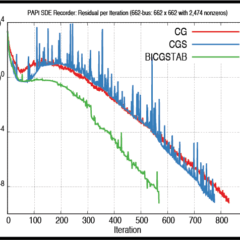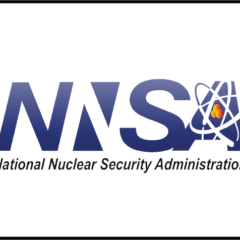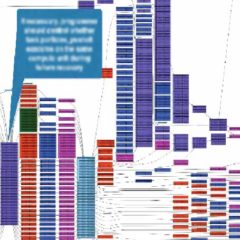Addressing a National Imperative
The Exascale Computing Project was an aggressive research, development, and deployment project focused on delivery of mission-critical applications, an integrated software stack, and exascale hardware technology advances.
Application Development

Chemistry and Materials
This area focuses on simulation capabilities that attempt to precisely describe the underlying properties of matter needed to optimize and control the design of new materials and energy technologies. These applications require the use of sophisticated models and algorithms to solve complex physics equations.

Co-design
These projects target crosscutting algorithmic methods that capture the most common patterns of computation and communication (known as motifs) in the ECP applications. The goal of the co-design activity is to integrate the rapidly developing software stack with emerging hardware technologies while developing software components that embody the most common application motifs.

Data Analytics and Optimization
This is an emerging area whose predictive capability is partially based on modern data analysis and machine learning techniques rather than strictly on approximate solutions to equations that state fundamental physical principles or reduced semiempirical models. This activity encompasses a broad range of research areas and techniques, some of which are only recently coming into maturity in the context of high-end simulation.

Earth and Space Science
The research in this area spans fundamental scientific questions, from the origin of the universe and chemical elements to planetary processes and interactions affecting life and longevity. These application areas treat phenomena where controlled and fine resolution data collection is extremely difficult or infeasible, and, in many cases, fundamental simulations are our best source of data to confirm scientific observations.

Energy
Energy applications focus on the modeling and simulation of existing and future technologies for the efficient and responsible production of energy to meet the growing needs of the United States. These applications generally require detailed modeling of complex facilities and multiple coupled physical processes. Their goal is to help overcome obstacles.

National Security
The focus of the National Security Applications is to deliver comprehensive science-based computational weapons applications able to provide, through effective exploitation of exascale HPC technologies, breakthrough modeling and simulation solutions that yield high-confidence insights into at least three currently intractable problems of interest to the NNSA Stockpile Stewardship Program (SSP).
Software Technology

Data and Visualization
The ECP’s software portfolio has a large collection of data management and visualization products that provides essential capabilities for compressing, analyzing, moving, and managing data. These tools are becoming even more important as the volume of simulation data that is produced grows faster than the ability to capture and interpret it.

Development Tools
The team is enhancing existing widely used performance tools and developing new tools for next-generation platforms. As node architectures become more complicated and concurrency even more necessary, impediments to performance and scalability become even harder to diagnose and fix. Development tools provide essential insight into these performance challenges and code transformation and support capabilities that help software teams generate efficient code, use new memory systems, and more.

Mathematical Libraries
High-performance scalable math libraries have enabled parallel execution of many applications for decades. Collaborative teams are providing the next generation of these libraries to address needs for latency hiding, improved vectorization, threading, and strong scaling. In addition, they are addressing new demands for system-wide scalability including improved support for coupled systems and ensemble calculations.

NNSA Software
The NNSA supports the development of open source software technologies that are both important to the success of national security applications and externally impactful for the rest of the ECP and the broader community. These software technologies are managed as part of a larger Advanced Simulation and Computing (ASC) portfolio, which provides resources to develop and apply these technologies to issues of importance to national security.

Programming Models and Runtimes
The team is developing exascale-ready programming models and runtimes, addressing in particular the important design and implementation challenges of combining massive intra-node and inter-node concurrency into an application. They are also developing a diverse collection of products that further address next-generation node architectures to improve realized performance, ease of expression, and performance portability.

Software Ecosystem and Delivery
This technical area of the ECP software group coordinates the delivery of E4S, the new HPC software ecosystem, and provides important software build, test and integration tools, in particular Spack, and containers environments that leverage emerging industry standards for portable execution adapted to leadership computing platforms. This area also provides the critical resources and staffing that support ECP ST continuous integration testing and product releases via E4S.
Hardware & Integration

Application Integration at the Facilities
Application integration helps ensure that Exascale Computing Project (ECP) applications are properly prepared for the forthcoming US Department of Energy (DOE) exascale systems. It also ensures that the DOE HPC facilities (hereafter referred to as Facilities) are aware of ongoing application development efforts and can contribute their experience and expertise in porting applications to the Facility-specific architectures.

Facility Resource Utilization
Producing an exascale-capable environment requires access to high-performance computing (HPC) resources for the purpose of application and software testing and development. Facility Resource Utilization is a collaboration between the Exascale Computing Project (ECP) and US Department of Energy (DOE) HPC facilities to ensure effective access to current production systems and pre-exascale and exascale computers.

Hardware Evaluation
Hardware Evaluation (HE) staff provide independent architectural analyses of exascale hardware components—even those that have not yet materialized—by using a variety of analysis tools and approaches. Their findings inform system design, highlight opportunities and challenges for scientific applications, and provide understanding of observed performance and efficiency from a hardware and software perspective.

PathForward
PathForward seeks to prepare the US industry for exascale system procurements and generally improve US competitiveness in the worldwide computing market. Evidenced by CORAL2 offerings, PathForward successfully influences US high-performance computing (HPC) vendors to maintain focus on designing and building much more powerful and balanced computers for US Department of Energy simulation workloads.

Software Deployment at the Facilities
Through close partnership with ECP code teams, DOE HPC Facilities, and vendors, the Software Deployment team deploys and integrates an exascale software stack and deploys a software integration and testing capability at the Facilities to support continuous integration with site environments, including container technologies and software development kits.

Training and Productivity
For applications to take full advantage of exascale hardware and software, a robust developer training and productivity program keeps application and software team members, staff, and other stakeholders abreast of emerging technologies and key technologies of importance to ECP. These projects are done in close collaboration among the computing facilities, vendors, and the ECP community.


